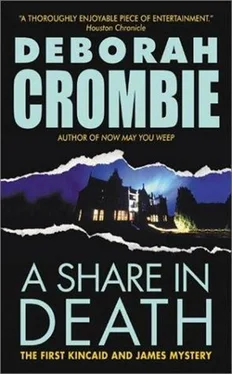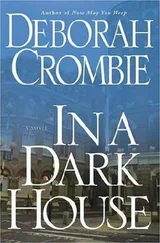Deborah Crombie - A Share In Death
Здесь есть возможность читать онлайн «Deborah Crombie - A Share In Death» весь текст электронной книги совершенно бесплатно (целиком полную версию без сокращений). В некоторых случаях можно слушать аудио, скачать через торрент в формате fb2 и присутствует краткое содержание. Жанр: Триллер, на английском языке. Описание произведения, (предисловие) а так же отзывы посетителей доступны на портале библиотеки ЛибКат.
- Название:A Share In Death
- Автор:
- Жанр:
- Год:неизвестен
- ISBN:нет данных
- Рейтинг книги:3 / 5. Голосов: 1
-
Избранное:Добавить в избранное
- Отзывы:
-
Ваша оценка:
- 60
- 1
- 2
- 3
- 4
- 5
A Share In Death: краткое содержание, описание и аннотация
Предлагаем к чтению аннотацию, описание, краткое содержание или предисловие (зависит от того, что написал сам автор книги «A Share In Death»). Если вы не нашли необходимую информацию о книге — напишите в комментариях, мы постараемся отыскать её.
A Share In Death — читать онлайн бесплатно полную книгу (весь текст) целиком
Ниже представлен текст книги, разбитый по страницам. Система сохранения места последней прочитанной страницы, позволяет с удобством читать онлайн бесплатно книгу «A Share In Death», без необходимости каждый раз заново искать на чём Вы остановились. Поставьте закладку, и сможете в любой момент перейти на страницу, на которой закончили чтение.
Интервал:
Закладка:
He’d blown it. All Cassie’s armor had fallen back into place with a clang.
Eddie Lyle sat in the sitting room armchair, a newspaper spread open on his lap.
Kincaid, retreating from Cassie’s office, paused in the doorway. Could he escape with a nod and a greeting? His hesitation proved his undoing.
Lyle looked up and spoke. “Mr. Kincaid.” He rattled the paper. “We’ve made the local rag this morning. I do hope the nationals don’t pick it up. I don’t want my daughter distressed by reading some sensational account.”
Caught between going and staying and not wanting to commit himself to a prolonged conversation, Kincaid wandered over to the sofa opposite Lyle and leaned against its rolled, velvet back. The tufted buttons dug into his thigh. “Your daughter’s the same age as Angela Frazer?”
“Yes, she’s fifteen, but-”
“Most fifteen-year-olds don’t read the papers, Mr. Lyle. I wouldn’t worry.”
“Chloe’s not a bit like Angela Frazer, Mr. Kincaid. She’s a very good student, and I’ve always encouraged her to keep up with world affairs.”
“She’s away at school, then?”
“Yes, but close enough that we can have her home most weekends.” Lyle took off his spectacles and pinched the bridge of his nose between his thumb and forefinger. “My daughter’s going to have all the advantages, Mr. Kincaid. She won’t need to scrape and struggle for things the way I did.”
Finding Lyle almost bearable now that he wasn’t spouting pompous grievances, Kincaid refrained from saying that few children seemed to appreciate being given advantages their parents lacked-they saw such benefits as their due.
Lyle must have done well enough for himself, though-a daughter away at school, clothes which looked expensive even if ill-fitting, and timeshare holidays didn’t come cheaply. “I understand you were in the army?”
“They educated me, but I got no free ride, if that’s what you’re thinking. I paid my dues, Mr. Kincaid, I paid my dues.” Lyle looked back at his paper, folding it and snapping the crease in sharply.
Having a conversation with Eddie Lyle was a bit like treading on eggshells, thought Kincaid, no matter how carefully you stepped, you made a mess of it.
The address was a narrow, terraced house in one of the winding alleys behind Thirsk’s market square. A brass knocker shone and a few defiant petunias still brightened the window boxes. Before he could ring, the door opened and he faced a middle-aged woman with faded, fair hair.
“Mrs. Wade?” The woman nodded. “May I come in? My name’s Kincaid.” He handed her his I.D. card and she examined it carefully, then stepped back in silent acquiescence. She wore what appeared to be her Sunday best, a navy, serge shirtwaist with white cuffs and collar. The pale hair was carefully combed, but her eyes were red and swollen with weeping and her face sagged as if gravity had become an unbearable burden. Even her lipstick seemed to be slipping from her lips, a slow, red avalanche of grief.
“I knew he was dead.” Her voice, when it came, was flat, uninflected, and directed somewhere beyond him.
“Mrs. Wade.” Kincaid’s gentle tone recalled her, and her eyes focused on his face for the first time. “I don’t want to mislead you. I’m not really here on police business. The local C.I.D. is officially investigating your son’s death. I had met Sebastian at Followdale, where I’m staying as a guest, and I wanted to offer my condolences.”
“She said, that nice policewoman who came yesterday, that a policeman staying in the house had found him. Was that you?”
“Yes, more or less,” Kincaid said, afraid the knowledge that the children had actually discovered her son’s body would only add to her distress.
“Did you… how…” She abandoned whatever she had been going to ask, finding, Kincaid felt, that hearing a physical description of the circumstances of her son’s death was beyond her present level of endurance. Instead she looked at him again, and asked, “Did you like him?”
“Yes, I did. He was kind to me, and very amusing.”
She nodded, and some tension in her relaxed. “I’m glad it was you. No one’s come. Not even that Cassie.” She turned from him abruptly and led the way into the sitting room. “Would you like some tea? I’ll just put the kettle on.
The room in which she left him was cold, clean, well-kept and utterly devoid of charm or comfort. The air had the stale odor of an old steamer trunk. The wallpaper had once been rose. The furniture might have belonged to Mrs. Wade’s parents, new and dubiously respectable fifty years ago. There were no books, no television or radio. She must live in the kitchen, Kincaid thought, or a back parlour. This room had surely not been used since the last death in the family.
The tea things were carefully arranged on an old tin tray, with mismatched, faded china cups and saucers. “Mrs. Wade,” Kincaid, began, when she had settled herself in one of the horsehair chairs and was occupied pouring the tea, “how did you know, yesterday, that your son was dead? Did someone tell you?”
“He did.” She answered flatly, glancing quickly at him and then back at her tea. She held the cup close to her chest, both hands wrapped around it as if its warmth could revive her. “I woke in the night, early morning really, and I felt him there, in my room. He didn’t speak to me, not out loud like, but somehow I knew that he wanted me to know that he was all right, not to worry about him. And I knew he was dead. That’s all. But I knew.”
And so she had risen, and dressed, and waited all those hours for someone to come and tell her, to make death official. Ten years ago Kincaid would have scoffed at her story, put it down to overwrought imagination charged by grief, convenient hindsight. But he had heard too many similar accounts not to have some respect for the lingering power of the spirit.
Kincaid set his cup down gingerly in its saucer, the violets on the cup meeting the saucer’s roses in delicate profusion. Mrs. Wade’s attention had wandered from him again. She sat with her eyes fixed on the opposite wall, the forgotten teacup still clasped in her hands. “Mrs. Wade,” he said quietly, “who were Sebastian’s particular friends?”
Her eyes came back to him, startled. “I can’t say as he had any, not really. He was at work all day and into the evening, most days. He liked to use the…” she faltered for a moment, “pool, after work. One of the perks of having a cushy job, he called it. I know he didn’t get on with that Cassie. Said she lorded it over everybody, and her no better than she should be. A construction foreman’s daughter from Clapham. Liked them to think she came from landed gentry, or some such. He used to tell me about the folk who came to stay, what they wore, how they talked. Sometimes he could make it seem like they were right there in the room with you.” She smiled, remembering, and Kincaid could hear Sebastian’s light voice, wickedly mimicking the pompous utterances of his unsuspecting victims. “But no one ever came back here with him. Mostly when he wasn’t working he stayed in his room.”
“Would you mind if I had a look at Sebastian’s room, Mrs. Wade?”
He didn’t know what he’d expected. But whatever preconceptions had hovered on the fringe of his imagination-posters of rock stars, perhaps, remnants of adolescence-they had been nothing like this.
This, it seemed, was where Sebastian had spent his money, apart from the payments on his motorbike, and what he spent on his clothes. The room was fitted with a pale gray Berber wool carpet, a flat commercial weave, very expensive looking. Lustrous green plants filled strategic corners. The dresser and side chairs looked like antiques, or good reproductions. The bed had high, matching curved ends. Kincaid believed it was called a sleigh bed, and again, probably a reproduction. Hanging on the pale gray walls were museum-quality framed prints, some Modernists, one or two Kincaid thought he recognized as American Impressionists.
Читать дальшеИнтервал:
Закладка:
Похожие книги на «A Share In Death»
Представляем Вашему вниманию похожие книги на «A Share In Death» списком для выбора. Мы отобрали схожую по названию и смыслу литературу в надежде предоставить читателям больше вариантов отыскать новые, интересные, ещё непрочитанные произведения.
Обсуждение, отзывы о книге «A Share In Death» и просто собственные мнения читателей. Оставьте ваши комментарии, напишите, что Вы думаете о произведении, его смысле или главных героях. Укажите что конкретно понравилось, а что нет, и почему Вы так считаете.












